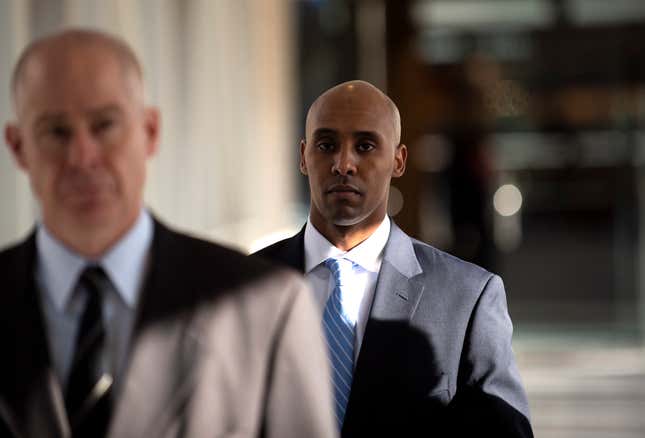
A jury on Tuesday convicted a now former Minneapolis police officer of murder for shooting and killing a woman after responding to a 911 call she made to report a possible sexual assault.
Mohamed Noor, who was the city of Minneapolis’ first police officer from its growing Somali American community, faces up to 16 years in prison after a jury took 11 hours to find Noor guilty of third-degree murder and second-degree manslaughter in the July 2017 death of Justine Ruszczyk Damond, the Minnesota Star-Tribune reports.
The jury acquitted him of a more serious second-degree murder charge. Sentencing is set for June 7.
After the verdict, both the police chief, Medaria Arradondo, and the police union offered their “apologies” and “condolences” to Damond’s family.
Noor’s family, in a case where members of their Somali community feared Noor would not be treated as other police officers would have been under similar circumstances, expressed outrage.
“I’m crying because of how the case was handled,” Noor’s cousin Goth Ali told the Star-Tribune. “What happened was injustice. This is shocking. My cousin didn’t get a fair trial.”
Damond, a white woman from Australia who was living with her fiance in Minneapolis at the time of her death, was killed after Noor and his partner responded to two 911 calls she made to report a possible sexual assault taking place behind her home.
Noor testified that a loud sound startled him and his partner the night of the fatal shooting. Fearing they were being ambushed, Noor said he fired one time, hitting and killing Damond.
The prosecution argued there was no justification for firing his weapon and urged jurors to find Noor guilty of murder.
As the New York Times notes, convictions of police officers in shootings of people, even when they’re unarmed, is rare. Just two years ago, the jury in the fatal shooting of Philando Castile, an unarmed school worker whose death was seen in real time on a Facebook Live recording, found the officer who killed him not guilty of all charges.
That’s not to say, of course, that Damond deserved to die, or that Noor should not have been convicted. But one can’t help but note the differences in tone and outcome in this case compared to cases of other instances of police shootings of unarmed, say, black people.
For instance, in the Castile case, where were the public police union or police leadership apologies to the Castile family? Where were the exhortations from city leaders to wait for the outcome of a full investigation? And of course, one must note the lack of a guilty verdict in the Castile case and in that of other fatal police shootings of black people.
But perhaps that’s because the black man that Castile was — beloved as he also was by all reports, especially by the children he cared for at the school where he worked — was just not the perfect victim, the “most innocent” victim, as Damond’s family’s attorney once described her.
Perhaps unlike former officer Noor, the officer in the Castile case —or officers in the numerous fatal shootings of young black people across this nation —just wasn’t “other” enough as the first Somali American cop in the city of Minneapolis likely was viewed.
So, in this case, there is perhaps “justice” for one family who wrongly lost a loved one to a police officer’s bullet.
Where is the justice for the rest?

